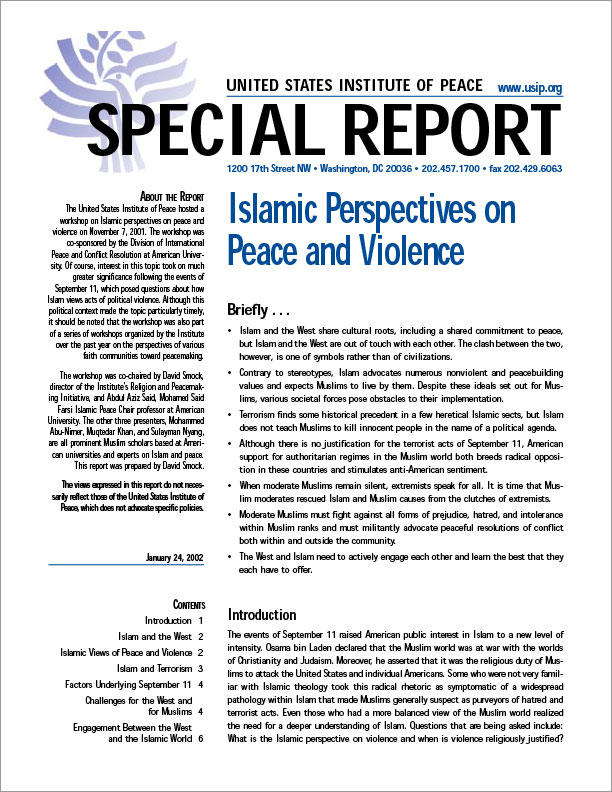Islamic Perspectives on Peace and Violence

Summary
- Islam and the West share cultural roots, including a shared commitment to peace, but Islam and the West are out of touch with each other. The clash between the two, however, is one of symbols rather than of civilizations.
- Contrary to stereotypes, Islam advocates numerous nonviolent and peacebuilding values and expects Muslims to live by them. Despite these ideals set out for Muslims, various societal forces pose obstacles to their implementation.
- Terrorism finds some historical precedent in a few heretical Islamic sects, but Islam does not teach Muslims to kill innocent people in the name of a political agenda.
- Although there is no justification for the terrorist acts of September 11, American support for authoritarian regimes in the Muslim world both breeds radical opposition in these countries and stimulates anti-American sentiment.
- When moderate Muslims remain silent, extremists speak for all. It is time that Muslim moderates rescued Islam and Muslim causes from the clutches of extremists.
- Moderate Muslims must fight against all forms of prejudice, hatred, and intolerance within Muslim ranks and must militantly advocate peaceful resolutions of conflict both within and outside the community.
- The West and Islam need to actively engage each other and learn the best that they each have to offer.
About the Report
The United States Institute of Peace hosted a workshop on Islamic perspectives on peace and violence on November 7, 2001. The workshop was co-sponsored by the Division of International Peace and Conflict Resolution at American University. Of course, interest in this topic took on much greater significance following the events of September 11, which posed questions about how Islam views acts of political violence. Although this political context made the topic particularly timely, it should be noted that the workshop was also part of a series of workshops organized by the Institute over the past year on the perspectives of various faith communities toward peacemaking.
The workshop was co-chaired by David Smock, director of USIP's Religion and Peacemaking Initiative, and Abdul Aziz Said, Mohamed Said Farsi Islamic Peace Chair professor at American University. The other three presenters, Mohammed Abu-Nimer, Muqtedar Khan, and Sulayman Nyang, are all prominent Muslim scholars based at American universities and experts on Islam and peace. This report was prepared by David Smock.
The views expressed in this report do not necessarily reflect those of the United States Institute of Peace, which does not advocate specific policies.



